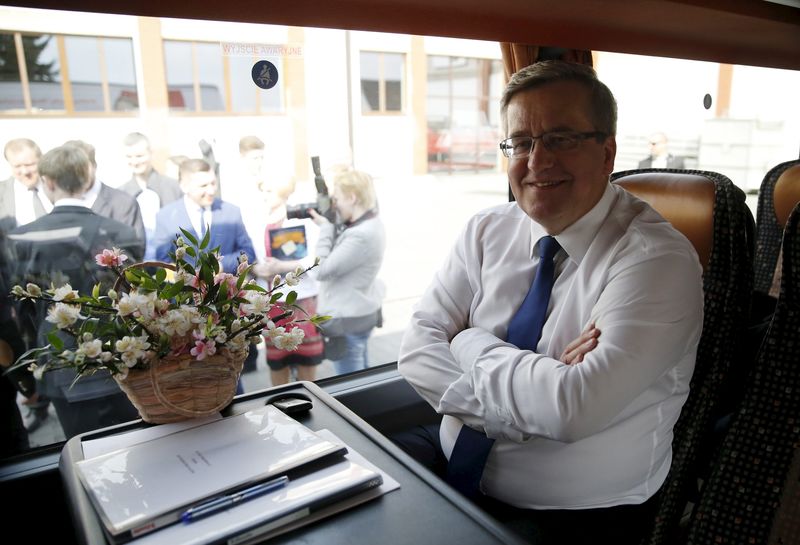By Wiktor Szary and Pawel Sobczak
WARSAW (Reuters) - Buoyed by his strong defense background and Poles' renewed fear of Russia stoked by the Ukraine crisis, Bronislaw Komorowski looks likely to win the first round of Poland's presidential election on Sunday.
How to ensure the security of Poland in the face of events in Ukraine was the paramount question presidential hopefuls had to answer when they gathered in a TV studio this week for a pre-election debate.
That issue has preoccupied Poles since Russia's intervention in neighboring Ukraine last year. While Poland is now a member of the European Union and a staunch NATO ally of the United States, it was under Soviet domination for decades after World War Two and so remains deeply sensitive to any Russian actions in the region.
Pre-election opinion polls give Komorowski, a former defense minister, around 40 percent of the presidential vote, with conservative rival Andrzej Duda on about 25-30 percent.
Pollsters predicted Komorowski would come first on Sunday but face Duda in a second-round run-off later in May that the incumbent is also likely to win.
In Poland's parliamentary democracy the prime minister runs the government but the president wields clout as head of the armed forces, in coordinating foreign policy with the foreign minister, signing or vetoing bills and drafting his own legislation. He also appoints the head of the central bank although parliament needs to approve the choice.
Szymon, a 37-year-old entrepreneur in Warsaw, said Komorowski is best suited to watch over the nation's security. "He understands the specifics of the Polish army," he said.
A source in Komorowski's re-election campaign, who spoke on condition of anonymity, said it was deliberately emphasizing security challenges to capitalize on the president's strong reputation on defense.
"Let's remember that for a long time there has not been a military conflict as close to the Polish borders as it is now," Komorowski, who is closely allied with Poland's governing center-right party the Civic Platform, said last week.
Many Poles are afraid former Soviet master Russia could target them next after Moscow's annexation of Ukraine's Crimea Peninsula and its support for separatists in eastern Ukraine.
In April, Komorowski, 62, announced a government decision to negotiate to buy a new missile defense system and 50 helicopters in deals worth an estimated $8 billion, the largest purchase in Poland's military history. Such announcements are usually made by the government itself.
Prime Minister Ewa Kopacz this week joined Komorowski at a campaign stop in a weapons factory, praising him for his involvement in Poland's decision to spend an annual 2 percent of its gross domestic product (GDP) on the military.
Komorowski's main rival, Duda, has never been a minister and has no security background. Backed by the largest opposition group, the conservative Law and Justice, his campaign has focused on a promise to lower the retirement age and fight economic inequality.

Duda, who is 42, has won over some voters with a vigorous campaign, even if he lacks the incumbent's track record on defense. "He's a young man, energetic one, and my money is on him," said Elzbieta, a 66-year-old retiree.